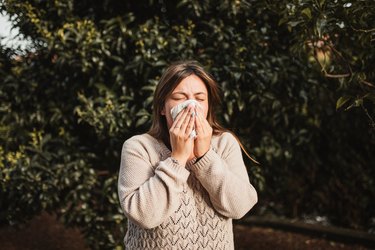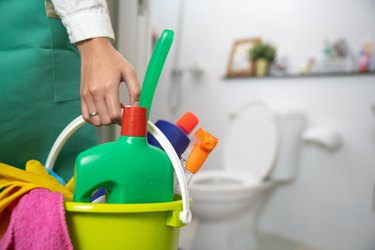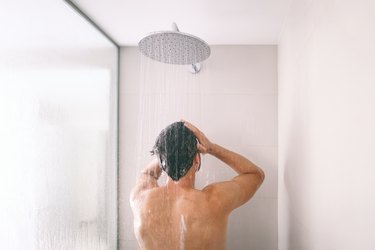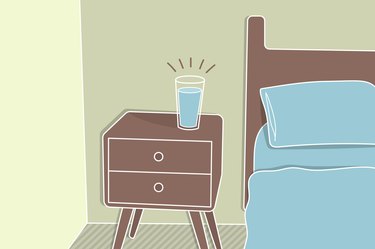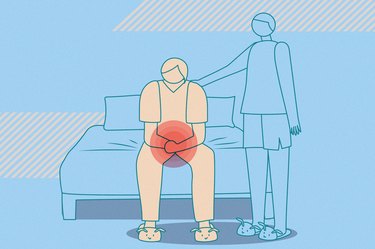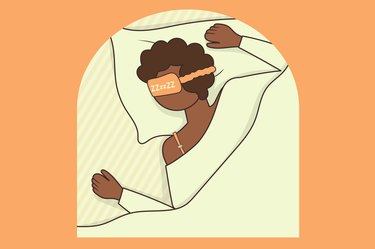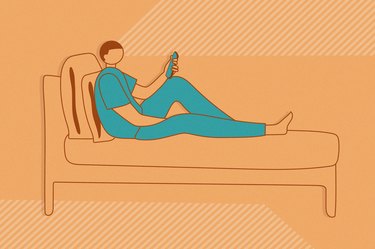
Falling asleep in your street clothes can make you feel a little grimy in the morning. But that seemingly minor ick factor might turn major when you find out that the gunk on your clothes could potentially make you sick. (Yes, really.)
The Downsides of Wearing Your Street Clothes to Bed
Video of the Day
Unless you're spending 24/7 in a sterile environment, your clothes are picking up germs as you go about your day. That's true even if they look clean and you're not in a "germy" environment (like a hospital or doctor's office), says Nikhil Bhayani, MD, FIDSA, an infectious disease physician with Texas Health Resources in Bedford, Texas.
Video of the Day
Once those buggers (which can include microbes like Salmonella, E. coli and Staphylococcus) latch onto your fabric, they'll probably stick around for a while. We're talking around 90 days for cotton and more than 200 days for polyester, per May 2020 research published in the journal GMS Hygiene and Infection Control. From there, the germs can transfer directly to your skin.
Once that happens, there's a legit possibility that they could infect you and make you sick, especially if you're wearing the clothes for long stretches — like while you're sleeping. They can also transfer onto your sheets and multiply from there, turning your bed into a germy cesspool. The risk of infection is higher if you have a weakened immune system, Dr. Bhayani says. But ultimately, anyone can get sick from sleeping in dirty clothes.
(And if this all sounds a little far-fetched, consider the fact that even shaking out dirty or soiled laundry can generate germ-laden aerosols that could transmit diseases, according to the Center for Disease Control and Prevention.)
Infectious diseases aren't the only concern here. If you have seasonal allergies, the pollen that latches onto your clothing while you're outside can trigger your symptoms, disrupting your sleep or leaving you stuffy and congested in the morning. It's the reason why allergy experts, including those at the American College of Allergy, Asthma, & Immunology, always recommend removing your outdoor clothes and showering as soon as you come inside when pollen counts are high.
What to Do Instead
Changing from street clothes to clean sleep clothes (or no clothes, if that's easier) is your best bet, Dr. Bhayani says. "It's a good practice, irrespective of a late night," he says.
It's also a good idea to wash your outside clothes before putting them on again, so you don't re-expose yourself to any lingering germs tomorrow or the day after. If you absolutely don't have the energy to remove your street clothes before bed, at least decontaminate your sleep space by washing your sheets the next morning, Dr. Bhayani recommends.
So, How Bad Is It Really to Sleep in Your Outside Clothes?
Crawling into bed in your street clothes can up your exposure to illness-causing germs and potentially make you sick. And if you have allergies, there's a good chance you'll notice your symptoms flare up while you're trying to snooze.
Bottom line: Once you consider the downsides, it likely doesn't seem worth it. So if you can, take the extra two minutes to pull off your daytime outfit and put on your pajamas.
Was this article helpful?
150 Characters Max
0/150
Thank you for sharing!
Thank you for your feedback!
Is this an emergency? If you are experiencing serious medical symptoms, please see the National Library of Medicine’s list of signs you need emergency medical attention or call 911.

